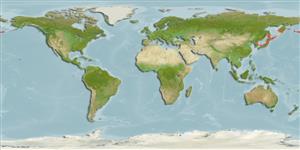Environment: milieu / climate zone / depth range / distribution range
Ecology
Marine; demersal; depth range 150 - 250 m (Ref. 83439). Temperate
Northwest Pacific: known only from the Sea of Japan, Sea of Okhotsk, and Pacific coast of Hokkaido.
Size / Weight / Age
Maturity: Lm ? range ? - ? cm
Max length : 10.0 cm SL male/unsexed; (Ref. 559)
Short description
Identification keys | Morphology | Morphometrics
Dorsal spines (total): 7; Dorsal soft rays (total): 10 - 12; Anal soft rays: 11 - 13. This species is distinguished by the following set of characters: simple nasal spines; almost straight uppermost preopercular spine with 2 small cusps dorsally and barbed posterior cusp; elongated first dorsal fin in males; lateral line reaching almost base of caudal fin; with ventral lateral cirrus (Ref. 83439).
Usually occurs on sandy-muddy bottoms (Ref. 83439).
Life cycle and mating behavior
Maturity | Reproduction | Spawning | Eggs | Fecundity | Larvae
Masuda, H., K. Amaoka, C. Araga, T. Uyeno and T. Yoshino, 1984. The fishes of the Japanese Archipelago. Vol. 1. Tokai University Press, Tokyo, Japan. 437 p. (text). (Ref. 559)
IUCN Red List Status (Ref. 130435: Version 2024-2)
Threat to humans
Harmless
Human uses
Tools
Special reports
Download XML
Internet sources
Estimates based on models
Preferred temperature (Ref.
123201): 0.7 - 7.6, mean 2 °C (based on 27 cells).
Phylogenetic diversity index (Ref.
82804): PD
50 = 0.6250 [Uniqueness, from 0.5 = low to 2.0 = high].
Bayesian length-weight: a=0.00955 (0.00344 - 0.02648), b=3.09 (2.85 - 3.33), in cm total length, based on LWR estimates for this (Sub)family-body shape (Ref.
93245).
Trophic level (Ref.
69278): 3.3 ±0.5 se; based on size and trophs of closest relatives
Resilience (Ref.
120179): Medium, minimum population doubling time 1.4 - 4.4 years (Preliminary K or Fecundity.).
Fishing Vulnerability (Ref.
59153): Low vulnerability (10 of 100).
